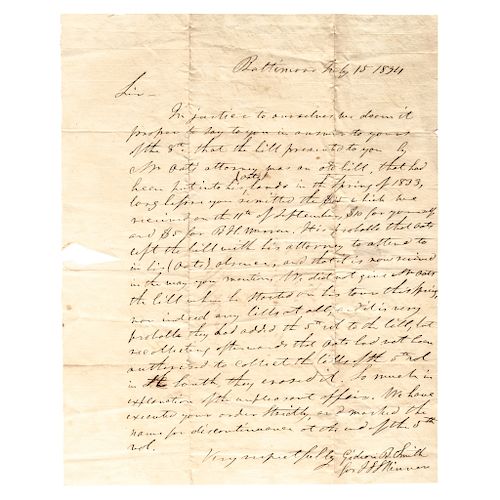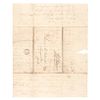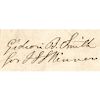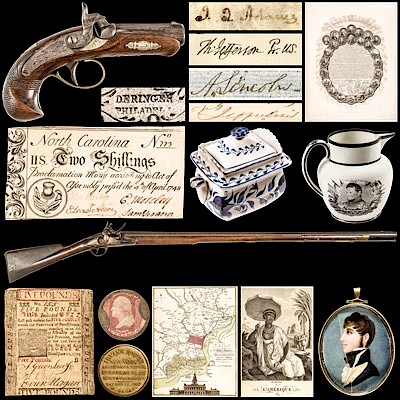Editor JOHN S. SKINNER Autographed Letter American Turf and Sporting Magazine
Lot 95
Categories
Estimate:
$300 - $400
Absentee vs Live bid
Two ways to bid:
- Leave a max absentee bid and the platform will bid on your behalf up to your maximum bid during the live auction.
- Bid live during the auction and your bids will be submitted real-time to the auctioneer.
Bid Increments
| Price | Bid Increment |
|---|---|
| $0 | $10 |
| $200 | $20 |
| $300 | $25 |
| $500 | $50 |
| $1,000 | $100 |
| $2,000 | $200 |
| $3,000 | $250 |
| $5,000 | $500 |
| $10,000 | $1,000 |
| $20,000 | $2,000 |
| $30,000 | $2,500 |
| $50,000 | $5,000 |
| $100,000 | $10,000 |
| $200,000 | $20,000 |
| $300,000 | $25,000 |
| $500,000 | $50,000 |
About Auction
By Early American History Auctions
Oct 19, 2019
Set Reminder
2019-10-19 12:00:00
2019-10-19 12:00:00
America/New_York
Bidsquare
Bidsquare : Historic Autographs-Currency-Political-Americana-Militaria-Guns
https://www.bidsquare.com/auctions/early-american-history-auctions/historic-autographs-currency-political-americana-militaria-guns-4513
326 Lots of Rare, Historic Autographs, Americana, Civil War Era, George Washington, Abraham Lincoln, Black History, Revolutionary War Era, Colonial America, Federal Period, War of 1812, Colonial Currency, Indian Peace Medals & more... Early American History Auctions auctions@earlyamerican.com
326 Lots of Rare, Historic Autographs, Americana, Civil War Era, George Washington, Abraham Lincoln, Black History, Revolutionary War Era, Colonial America, Federal Period, War of 1812, Colonial Currency, Indian Peace Medals & more... Early American History Auctions auctions@earlyamerican.com
- Lot Description
Autographs
John S. Skinner Letter Editor of the "American Turf Register and Sporting Magazine"
JOHN S. SKINNER, Postmaster of Baltimore and early Editor of the "American Turf Register and Sporting Magazine."
July 15, 1834-Dated, Autograph Letter Signed, "J S Skinner" one page on upper right corner in brown ink, from Baltimore, Very Fine. The letter measures 9.6" x 7.75" and the signature measures 2". It is written in brown ink on lined period paper by Gideon B. Smith, for J. S. Skinner. There is one small absence on the letters left side that is the result of its initial opening and breaking of the red wax seal and in no way interferes with the text. The integral cover also boasts a faint "Baltimore, MD" Postmaster Stamp in red ink, with some chipping along the left side and creases. The content of the letter refers to collecting on accounts for the "American Turf Register," a monthly periodical that Skinner himself started in August of 1829. A scarce letter with a rare early American sports related signature.
John S. Skinner, (1788-1851), lived an extraordinary life. Skinner had a notable time during the War of 1812. He was known as the "Paul Revere" of this war, and seeing as how he was the first to announce the approach of the British to Washington, after riding 90 miles in the night, one can see why the name fits. Skinner also has kept extremely famous company. He was with Francis Scott Key on the famed ship where Key was inspired to write "The Star Spangled Banner." And, General Lafayette stayed at Skinner's home during his visit to the U.S. in 1824. Lafayette later selected Mr. Skinner as agent to manage the 20,000-acre grant of land that had been voted Lafayette by Congress. Skinner was also the Postmaster of Baltimore from 1816-39, but his most famous contributions relate to agriculture. In 1819, Skinner established "The American Farmer", which was the first agricultural journal in the country. Continuing in this tradition, in 1829, he established the "American Turf Register and Sporting Magazine", the "Farmer's Library and Monthly Journal of Agriculture," as well as the "Plough, the Loom, and the Anvil". These periodicals gave a new stimulus to agricultural pursuits, and added to the general popularity of outdoor sports. He died in Baltimore on March 21, 1851.
- Shipping Info
-
Early American provides in-house worldwide shipping. Please contact us directly if you have questions about your specific shipping requirements.
-
- Buyer's Premium



 EUR
EUR CAD
CAD AUD
AUD GBP
GBP MXN
MXN HKD
HKD CNY
CNY MYR
MYR SEK
SEK SGD
SGD CHF
CHF THB
THB













